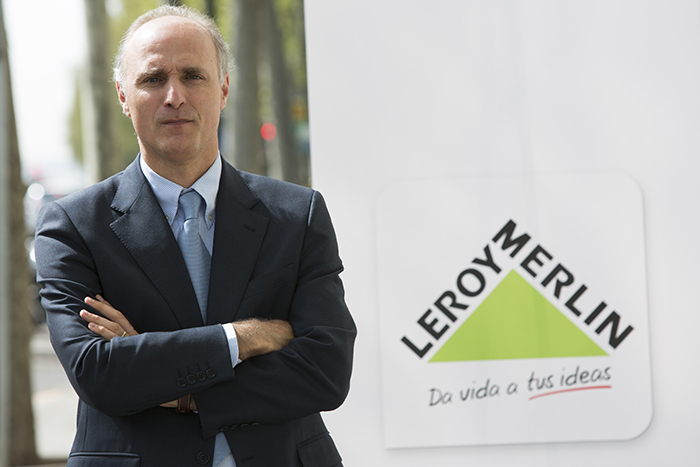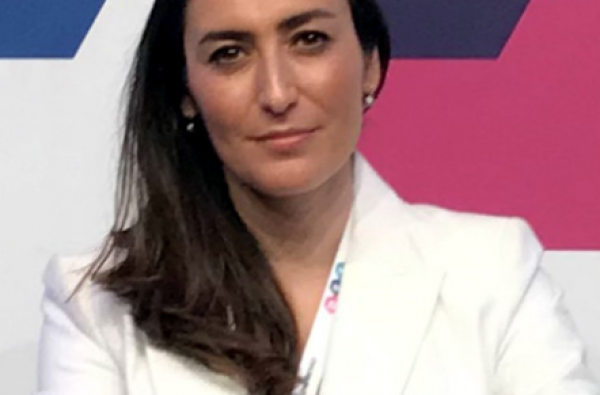For the CEO of Leroy Merlin Spain, Ignacio Sánchez, well-trained, experienced and cooperative talent is fundamental to success. For this reason, in addition to promoting technologies such as AI, he considers that companies should strengthen the human relationship with the client.
"Who can you fool for 365 days?" The question is written on the blackboard that the general manager of Leroy Merlin España, Ignacio Sánchez, has in his office with transparent walls. It is repeated to the teams in order to remind them that honesty is essential for this DIY company, which this year celebrates its 30th anniversary in Spain, to continue to be successful.
The manager states emphatically: "There can be no difference between what I say and what I do. Therefore, he recommends that team leaders earn prestige, leadership, and credibility and act in an exemplary manner to passionate the rest and drive change.
Following these values, he has held various positions of increasing responsibility since joining the company in 1993 as a management controller. Appointed CEO a decade ago, he now leads 15,000 people, a talent he considers essential to differentiate himself in an era where home conditioning stores are physical and virtual.
Every year MIT Technology Review publishes a list of 10 technologies that can change the world. This year's list includes artificial intelligence (AI) conversational assistants. How is your company tackling the eruption of AI?
This is an absolute priority for the company. My goal is to create the most powerful IA department for retail in Spain. Now we are going to have a massive entry of professionals: we have invited really disruptive people who will be able to attract others. We want all purchasing decisions, pricing, etc., to be driven by algorithms. In addition, we have invested 18 million euros to create a fully automated warehouse in Meco [Spain].
When did Leroy Merlin start working on the implementation of the latest technologies to improve the business?
During the crisis, in 2012, we thought that in a short time the world would be omnichannel and that there would be a need for tools and devices in the store that would allow all the digital activity to be done. The sales team no longer has to be physical, it has to be omnichannel, and so does logistics.
We had 130 technology projects per year thanks to which we have implemented a lot of changes, but we live in permanent dissatisfaction. Our new website is not a website, it is an ecosystem of more than 180 solutions, and integrating all that with millisecond requirements is difficult.
In recent years, we have started to see strong competition in the retail sector. How is Leroy Merlin facing new players like Amazon?
The first axis is to create that powerful IA department. The second is not to forget the importance of people, the human to human. We want a company in which all people are focused on the customer and where the human being comes first.
On the other hand, we want a great store experience so that when the customer goes, they find cracks, people who know more about kitchens than anyone else or their garden problem than anyone else and who will advise them exactly what they need. That's the real differentiation factor, that customers feel incredibly good in the store, not because of the algorithms, but because the human to human experience is good.
Is it necessary for digital transformation to be linked to a cultural transformation?
I say this equation a lot: "Old enterprise + new technology = expensive old enterprise". How many millions are being wasted in the world on technology for technology without changing anything? If you incorporate state-of-the-art technology into an obsolete company, it is still obsolete.
What capabilities do you think CEOs need today?
The CEO's vision has changed a lot with the crisis. One of the lessons we've learned is the strength of ethics. Savings banks and companies collapsed because there was an incredible lack of ethics. In the 21st century ethics is valued for the first time in history, because it positions you as a responsible company.
Also in the crisis, we realized that talent is an ecosystem, not a person. The fact that the CEO is a god is over: you just create the conditions for people to develop without limit, knowing that the first one to develop without limit is you. You have to study now more than in the career and the MBA together. You have to learn the whole digital subject and Supply B2C that until five years ago did not exist...
The good thing about the 21st century is that talent is critical. And if talent is critical, you can't create a high-performance ecosystem without talent.

General Director of Leroy Merlin
How do you develop and motivate that talent?
Our obsession is for people to learn. We invest a lot of money and effort in training. But then I always tell [the teams] one thing: "Your professional career is your responsibility, not mine, and you have to help others get better, because the individualists here don't make sense.
If your company tells you that by developing people you will achieve everything, you realize that you are on a highway and that from salesperson you can go on to section chief and from store manager to general manager.
How do the teams react to the new scheme that now stores are physical and virtual?
Training 15,000 people to digitally know how to sell you a long tail range and physically master the product is very complicated. That's why I don't need people who work two years at Leroy Merlin, I need people who work all their lives. They love the culture, they love the equipment and they realize they've grown.
Transformation also requires organizational change, as companies increasingly need more flexible structures. Is Leroy Merlin betting on agile methodologies?
We have trained the 1,000 people who work here [at its headquarters in Alcobendas, Spain] in Scrum, agile methodologies and design thinking, and they are our working base in all projects. But if people who discover a problem and are not able to solve it in real-time, it is useless. We need agile people to manage agile methodologies.
We have to look for agile work systems with agile people, who get involved in the project because they are passionate about it. If you don't have passionate people doing completely disruptive things, it won't work in the long run.
Beyond the passion for the project, what do you think of the ability to collaborate?
If you create an ecosystem with people who just want to become the best individually, they will step on everyone to grow. I've had to get two kinds of profiles out of the company: the very low profile and the super killers, who didn't have bad training, but they destroyed people.
It's not about being the best, it's about being the best you can be. It's the culture of evolution, not competition with others. When a lot of good people leave, the problem isn't your company, it's the people who run it. I always tell managers that the first year they have the team they receive, the second year they build, the third year they consolidate and the fourth year they deserve.
What are your strategies for retaining talent in such a long term?
There are two ways to pay good people. One is the evolution of salaries even in the same category: if you're the best salesman in Spain, you can't earn the same as others. And the second is that, if the company does well, a percentage of profits is divided into shares for everyone. In this way, they go from being workers to collaborators and shareholders. At Leroy Merlin, 20% of the profit is divided between employees in shares.
In the end, digitizing is not just about integrating the cloud, it's about changing all the processes, and the first is retribution. You can't keep paying people a salary for working, because if they work well or badly you pay them the same. You have to offer an emotional salary.
In addition to taking care of the employee, are you taking specific measures to take better care of the environment?
We have a very complete CSR [Corporate Social Responsibility] strategic plan: we want to create a 360° circular recycling chain. For example: we want to cut up the 15,000 tons of pallets and other wood scraps we generate and send them out to make new boards. In addition, at Leroy Merlin, we only sell certified wood. We sell quality to generate responsible consumption. What is not responsible is to sell a floor or a partition that has to be changed every 60 days.
A company cannot load the planet, it has to create sustainable forests and long-term value chains. In the end, it's a question of ethics: you can't fool people into making money and you can't fool the planet either.
By Editors of the MIT Technology Review in Spanish



